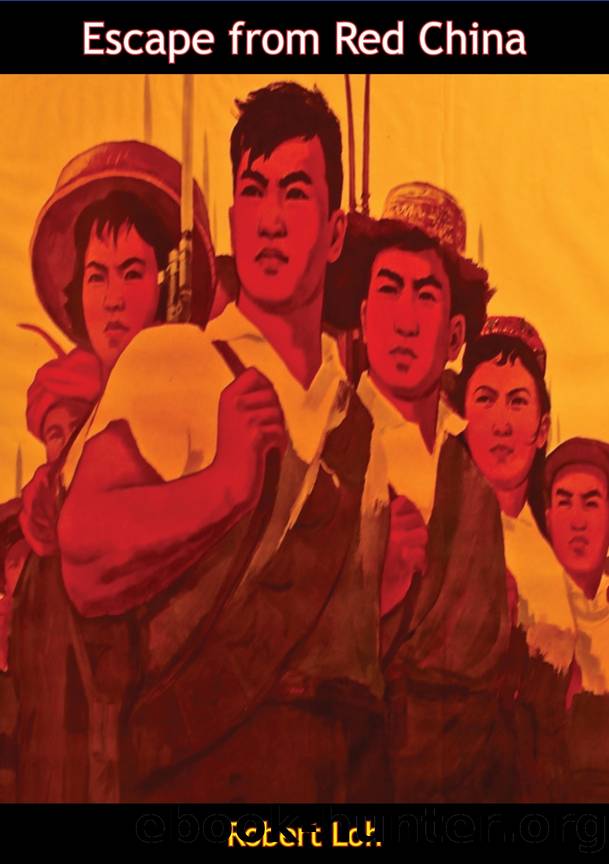Escape From Red China by Robert Loh & Humphrey Evans

Author:Robert Loh & Humphrey Evans [Loh, Robert & Evans, Humphrey]
Language: eng
Format: epub
ISBN: 9781376158335
Google: P9p5swEACAAJ
Barnesnoble:
Goodreads: 41825403
Publisher: Muriwai Books
Published: 2017-07-31T00:00:00+00:00
CHAPTER 9
If one word does not suffice,
A thousand are wasted.
âCHINESE PROVERB
DESPITE THE hysteria of the âhigh tide of socialist transformation,â the businessmen knew they had been robbed. They had been powerless to resist, and they were grateful to have escaped with the loss of only their property. They had long known that eventually their property would be expropriated, but they had been taught through fear to hide what they really felt about the Communistsâ banditry.
Nevertheless, they were amazed at how successfully they had been depicted abroad as having joyfully donated their possessions to the State. They viewed the deception with mixed feelings, because it had an important bearing on their own fate as well as on the regimeâs international strategy.
The strategy, of course, was designed to bring about the ultimate worldwide triumph of Communism. The people in the Western democracies, however, had been growing increasingly powerful and increasingly less impressed with both Communist theory and practice. The Chinese Communists, therefore, had turned their attention to the people of the so-called backward countries of Latin America, Africa and free Asia. The intention was to turn these huge masses against the Western democracies and eventually to align these areas with the Communist bloc.
In the struggle for these masses, the Communists had several advantages. Since World War II, the people of the backward countries had been in open rebellion against either Western colonial rulers or local feudalistic regimes. Sympathy for the aspirations of these impoverished people came from the Western democracies, but the Western governments tended to support the conservative elements who were attempting to suppress the revolutions. Moreover, aggressive Western commercial interests still practiced in these areas a form of economic exploitation. Finally, the racial bigotry of some Westerners convinced many in the backward countries that democratic ideals had little value.
The Communists, in fact, had only one disadvantage. The backward areas were still so politically undeveloped that the inflamed masses could not organize effective revolutions without the support and leadership of the middle classes. The bourgeoisie, however, identified themselves with the same class in the Western democracies, and instinctively accepted democratic idealism. They distrusted Communism, if only because Marx had declared their class an enemy and because in Soviet Russia the class had been brutally liquidated. If left to themselves, they ultimately would have aligned their new or reformed countries with the West.
The Communists would have permitted this to happen if they really believed their own dogma that âsocialist revolution is not for export,â and that human social development follows an immutable pattern that human will cannot alter. The circumstances in China, however, had been the same as those in the backward countries; the bourgeoisie had been dissatisfied with the Nationalist regime but as long as they supported it, the Communists had no chance for victory. Nevertheless, Mao Tse-tung, âre-interpretingâ Marxist-Leninist theories, succeeded in his bid for political control by using a trick which nullified the strength of the Chinese bourgeoisie. Once he and his Party were in power, the bourgeoisie discovered
Download
This site does not store any files on its server. We only index and link to content provided by other sites. Please contact the content providers to delete copyright contents if any and email us, we'll remove relevant links or contents immediately.
| Anarchism | Communism & Socialism |
| Conservatism & Liberalism | Democracy |
| Fascism | Libertarianism |
| Nationalism | Radicalism |
| Utopian |
The Secret History by Donna Tartt(19096)
The Social Justice Warrior Handbook by Lisa De Pasquale(12191)
Thirteen Reasons Why by Jay Asher(8914)
This Is How You Lose Her by Junot Diaz(6890)
Weapons of Math Destruction by Cathy O'Neil(6282)
Zero to One by Peter Thiel(5804)
Beartown by Fredrik Backman(5759)
The Myth of the Strong Leader by Archie Brown(5510)
The Fire Next Time by James Baldwin(5450)
How Democracies Die by Steven Levitsky & Daniel Ziblatt(5221)
Promise Me, Dad by Joe Biden(5154)
Stone's Rules by Roger Stone(5088)
A Higher Loyalty: Truth, Lies, and Leadership by James Comey(4965)
100 Deadly Skills by Clint Emerson(4927)
Rise and Kill First by Ronen Bergman(4790)
Secrecy World by Jake Bernstein(4754)
The David Icke Guide to the Global Conspiracy (and how to end it) by David Icke(4720)
The Farm by Tom Rob Smith(4514)
The Doomsday Machine by Daniel Ellsberg(4491)
